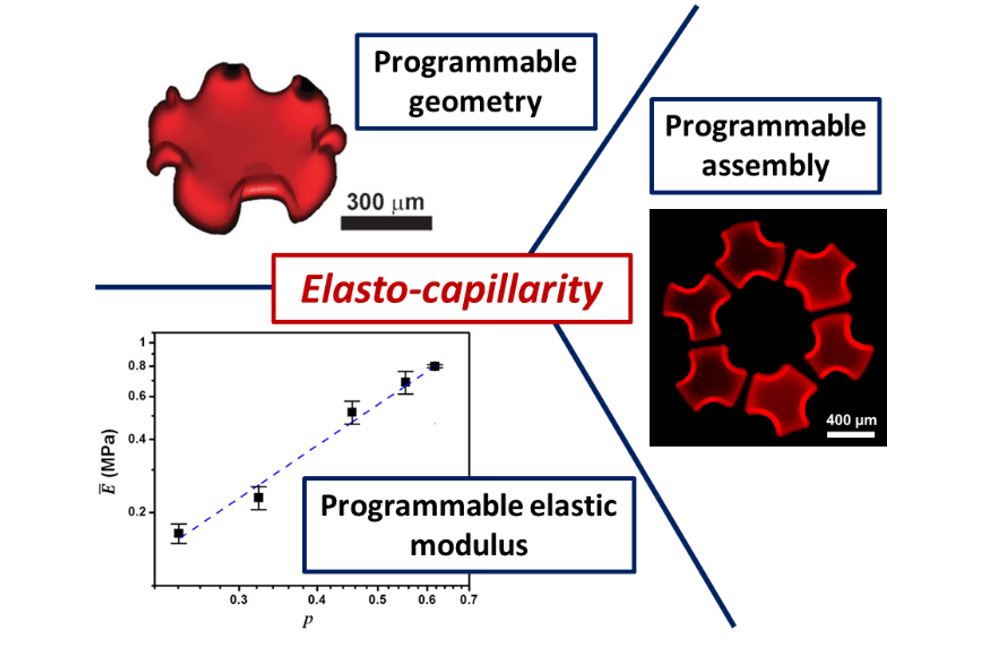Video Article Open Access
Elasto-capillary Deformation of Thin Polymer Sheets
Jinhye Bae1,2,3
1Department of NanoEngineering, University of California San Diego, La Jolla, CA 92093, USA
2Program of Chemical Engineering, University of California San Diego, La Jolla, CA 92093, USA
3Materials Science and Engineering Program, University of California San Diego, La Jolla, CA 92093, USA
Vid. Proc. Adv. Mater., Volume 2, Article ID 2105174 (2021)
DOI: 10.5185/vpoam.2021.05174
Publication Date (Web): 29 Jul 2021
Copyright © IAAM
Graphical Abstract

Abstract
Surface tension generally plays a negligible role on macroscopic scales, but it is often the dominant force on nanometer to micrometer length-scales. This talk is mainly focused on understanding how surface tension plays on sub-millimeter scale objects, especially on soft material systems, and how to utilize this phenomenon to assemble and deform soft objects. This talk will address several phenomena of micron-sized objects, which fabricated by photo-crosslinkable and temperature-responsive thin hydrogel sheets with simple to complex geometries, at fluid interfaces. Competition between surface energy and elastic bending energy allows the quantitative characterization of elastic properties of crosslinked thin hydrogel sheets in micron dimensions by using surface tension of liquids. In addition, I will introduce a new concept of capillary assembly of soft hydrogel sheets with non-Euclidean geometry. This study allows us to examine correlations between elastic properties and surface tension, as well as capillary interactions between soft hydrogel non-Euclidean objects which can be extended to more complex multi-polar interface deformation. Low-energy bending deformations of such objects, driven by surface tension, modifies the interactions between particles, while their temperature-dependent swelling enables switchable assembly.
Keywords
hydrogels; soft materials; capillarity; surface tension; interfacial assembly.
Acknowledgement
This research was funded by the Army Research Office through grant W911NF-16-1-0119, with additional support from the National Science Foundation MRSEC at UMass (DMR-0820506).
References
- J. Bae, N. P. Bende, A. Evans, J.-H. Na, C. D. Santangelo, R. C. Hayward, “Programmable and reversible assembly of soft capillary multipoles”, Materials Horizons, 2017, 4, 228-235.
- J.-H. Na, N. P. Bende, J. Bae, C. D. Santangelo, R. C. Hayward, “Grayscale gel lithography for programmed buckling of non-Euclidean hydrogel plates”, Soft Matter, 2016, 12, 4985-4990.
- J. Bae, T. Ouchi, R. C. Hayward, “Measuring the elastic modulus of thin polymer sheets by elastocapillary bending”, ACS Applied Materials & Interfaces, 2015, 7, 14734–14742.
Biography
Jinhye Bae is as an assistant professor in the Department of NanoEngineering at the University of California San Diego. She received her Ph.D. in Polymer Science and Engineering at the University of Massachusetts, Amherst in 2015, where she conducted research with Ryan Hayward on fluid interface mediated assembly and deformation of nanometer and micrometer sized soft materials. She then worked with Joost Vlassak in the School of Engineering and Applied Sciences at Harvard University as a postdoctoral fellow, on micromachined pico-calorimetric sensors for bioenergetic measurements and 3D printable soft ionic devices. Her research at the University of California San Diego focuses on understanding the deformation and assembly of soft matter on the nano to macro-scales, and integrate their unique characteristics into new approaches for applications in biomedical devices, soft robotics, actuators, and sensors.
Video Proceedings of Advanced Materials

Upcoming Congress



